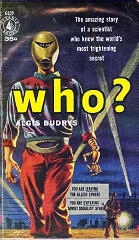Tue 10 Jun 2008
Death Noted: ALGIS BUDRYS (1931-2008).
Posted by Steve under Authors , Crime Fiction IV , Obituaries / Deaths Noted[2] Comments
Algis Budrys, best known as a science fiction writer and critic, died on June 9th. For an overview of his career in that field, I can do no better than send you to Todd Mason’s blog, thanks to a tip from Bill Crider, from whom I borrowed the cover image below.
Most of the other websites and blogs covering his passing will talk about his SF. He does have, however, one work cited in the Revised Crime Fiction IV, an artifact of sorts of the Cold War:

BUDRYS, ALGIS. Working name of Algirdas Jonas Budrys, 1931-2008.
Who? (Pyramid, 1958, pb) Badger (U.K.), 1960. Film: British Lion 1974, released in the U.S. as Man Without a Face; also released as Man in the Steel Mask; and as Prisoner of the Skull (scw: John Gould; dir: Jack Gold).
From wikipedia comes a detailed synopsis of the tale:
“A Soviet team abducts Dr. Lucas Martino, a leading Allied physicist in charge of a secret, high-priority project called K-88.
“Several months later, under American pressure, the Communist officials finally hand over an individual, claiming that he is Dr. Martino. The man has undergone extensive surgery for his injuries. He has a mechanical arm advanced beyond any produced in the West. More importantly, his face and head have been dramatically rebuilt, now resembling a near-featureless metal mask. A medical evaluation reveals that several of the man’s internal organs are also artificial. The Allies are suspicious that the Soviets have sent them a spy and are holding the real Martino for further interrogation.
“The struggle to determine the man’s true identity is the novel’s central conflict.”
But the book is much more than a Cold War espionage caper. Extracted from a review at www.trashfiction.co.uk/who.html is the following:
“It’s a philosophical piece about the nature of human identity, and how bound up it is in the existence of a face. Does a man lose his past if he (literally) loses face? Can you trust such a man? Is human interaction possible if one party can’t read the facial expressions of the other?”
June 10th, 2008 at 5:35 pm
Thanks…I shall have to upgrade the hastily-written bit, there. “The Master of the Hounds” (SEP, 1966) is a notable crime-fiction novelet by Budrys, as well–it picked up some sort of special citation from the MWA, and was loosely adapted as the film TO KILL A CLOWN. The film of WHO? has most often been circulated under the original title over the last decade or so.
June 10th, 2008 at 5:57 pm
Todd, Yes, you mentioned that Budrys’s short story “The Master of the Hounds” was crime fiction, and I should have picked up on it myself.
I’ve checked into the MWA connection, and it turns out that the story was nominated for an Edgar in the Best Short Story category in 1967.
It didn’t win — that happened to be “The Chosen One” by Welsh author Rhys Davies (NEW YORKER 6/4/66), which I’ll wager very few remember as being a crime story, much less an Edgar winner.
I’ve never seen either film, and I think maybe I should.
Best,
Steve